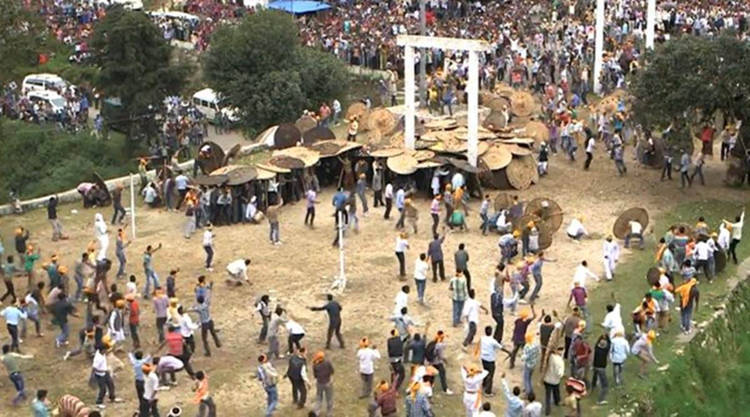Every year, hundreds of people from India’s Uttarakhand state engage in Bagwal, a brutal stone-pelting battle that often leaves dozens with severe injuries that require medical attention.
Bagwal literally means “fight with stones”, so it’s a pretty fitting name for a celebration that’s all about hurling big stones at the opposing side. Four clans gather in the Champawat district of Uttarakhand to take part in the unique event, despite the danger of getting seriously injured by the stones flying through the air. In fact, bloody wounds are the whole point of Bagwal as legend has it that the Hindu deity Barahi struck a deal with humans to rid them of demon invaders in exchange for a sacrifice in the form of blood.
The story goes that Devidhura, the town that hosts Bagwal every year, was once invaded by demons. Unable to fend off the threat themselves, the four local clans – Walik, Chamyal, Lamgaria, and Gaherwal – prayed to Barahi to save their lives. The goddess agreed on the condition that a human sacrifice be made to her each year, so the clans took turns to sacrifice one of their own.
One year, when the time came for one of the clans to sacrifice their last youth in honor of Barahi, the boy’s grandmother prayed to the goddess to spare him. The deity heard her prayer and offered the clans an alternative: each year on Rakhi day, members of the four clans would hurl large stones at each other and the blood spilled in the process would replace the human sacrifice.
It’s unclear when the Bagwal tradition began, but it is at least several centuries old and the descendants of the four clans still abide by their ancestors’ pledge, so much so that in 2013, when authorities tried altering the ceremony by replacing the stones with fruits and rubber balls, no one agreed. After all, the sacrifice of blood is the whole point of the celebration.
This year, the Bagwal stone-pelting battle of Devidhura was supposed to be a low-key affair this year, due to Covid-19, but devotees turned up in large numbers, eager to pelt the opposing clans with large stones. Interestingly, stones were banned by a high court years ago, but participants didn’t much care about that.
Bagwal only lasted seven minutes this year, but that was enough to leave 77 of the 300 brave devotees with injuries that required subsequent medical attention. That’s nothing new, to be honest, as in 2019, the number of injuries was about 100. But then again, that’s the whole point of the celebration, to spill blood in honor of Barahi.
Bagwal isn’t India’s only stone-pelting celebration. Years ago we also wrote about Gotmar Mela, another centuries-old tradition.

.jpeg&w=60&q=100&h=60)




.jpeg&w=60&q=100&h=60)






